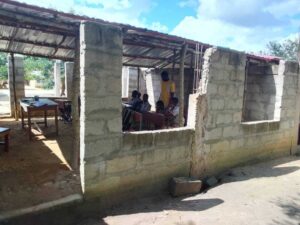Published
1 year agoon
By
Diella Teku
In the Shama District of the Western Region, the quality of education at Bokokope Basic School and Bosomdo D/A Primary and Junior High School is suffering due to inadequate infrastructure and a lack of basic resources, particularly furniture for teachers. The situation has led to health problems among the teaching staff, with some frequently seeking medical attention due to back pain, allegedly caused by the use of makeshift ‘dual desks’ intended for students.
At Bokokope Primary School, Assistant Head Teacher Shalom Sinbie detailed how the absence of proper furniture has forced teachers to sit on student desks, resulting in serious discomfort, particularly for female staff. “Our pregnant colleague, for instance, cannot sit for long periods, and many of us experience severe waist pains. This situation reduces the time we can spend in the classroom, and ultimately, it impacts the quality of education we provide,” Sinbie explained.
The issue at Bosomdo D/A Primary and Junior High School is equally concerning. Students are forced to learn in an uncompleted building due to a shortage of classrooms, which Headteacher Robert Adzewoda says has hindered educational progress. “Our current infrastructure only accommodates kindergarten, while primary and junior high school students are crammed into an unfinished structure. We urgently need a six-unit classroom block and the completion of our junior high school to prevent students from traveling long distances after Basic 6,” he appealed.

Uncompleted Classroom Block
The challenges facing Bosomdo extend beyond classrooms. The lack of accommodation for teachers has made it difficult to attract and retain qualified staff, further weakening the school’s ability to deliver quality education. Adzewoda called on philanthropists and organizations to support the school’s development, emphasizing that such contributions could significantly impact the future of children in the rural farming community of about 500 residents.
Despite these challenges, hope is not lost. Under the leadership of Nana Ama Boaduwaa, the Divine Educational Watch team recently stepped in, donating essential learning materials, including exercise books, mathematical sets, and water bottles to students in both communities. In expressing gratitude, Boaduwaa underscored the importance of collective efforts in supporting education, noting, “Education is a shared responsibility. We are optimistic that this initiative will enhance the learning experience for the children here and create lasting change in these communities.”
The donation is seen as a small but crucial step toward addressing the urgent needs of Bokokope and Bosomdo schools, with the hope that long-term solutions will follow to improve both teaching and learning conditions in the region.

























